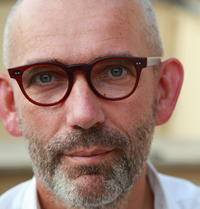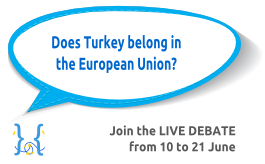Let’s face it: This is not the best time to discuss Turkey’s membership of the EU. We have just witnessed several rounds of police brutality in Istanbul and other Turkish cities after the occupation of a small park in central Istanbul got totally out of hand.
EU institutions have criticized the Turkish government for its heavy handedness in trying to end the protests. Turkish Prime Minister Erdoğan, for his part, said he basically did not care what the EU thought about him and his policies. It would be an understatement to conclude that we are faced with a serious crisis of trust between Turkey and the EU.
For the opponents of Turkey’s accession to the EU, this only proves their point that Turkey is not able and willing to comply with European standards and values in dealing with societal conflicts. Although I agree that the Turkish government has totally mishandled the recent protests and should be criticized for that, I would also urge all those involved not to jump to final conclusions on the future of EU-Turkey relations.
The EU is in the middle of a complicated negotiating process with Turkey about full membership that, if and when it happens, will fundamentally change both partners. Such a far-reaching operation cannot be made dependent on the successes or failures of one particular government. In other words: Turkey’s future cannot be hold hostage by the current Turkish administration. A recent public opinion poll showed that the majority of Turks, including parts of the ruling party’s electorate, agrees with the criticism of the EU on the authoritarian style of the Turkish prime minister and his unwillingness to look for a compromise. This is not the moment for the EU to let Turkey’s democrats down.
Live Debate
A few remarks on the arguments presented by my former colleague in the European Parliament, Renate Sommer. Unfortunately, these do not go beyond the usual combination of wrong assumptions and biased information. Let me mention the most disturbing ones.
Yes, the process of EU inspired reforms has slowed down. But does that really come as a surprise after years of German and French obstruction and after the EU, France and Cyprus have blocked half of the negotiating chapters? Looking, for instance, at the events of the last three weeks, it would definitively be good to discuss European legal norms and practices with Turkey and force the country to adopt and implement these. Alas, the EU has lost all leverage on this issue because these chapters (23 and 24) are blocked by Cyprus.
An example of deliberate misinformation is the claim by Ms. Sommer that the Turkish government recently introduced a ban on alcohol. She knows very well the new law limits the advertising and sales of alcoholic beverages, especially for youngsters. Many EU member states have done the same. This misrepresentation allows her to claim that Turkey as a whole defends Islamic values and that Mr. Erdoğan’s party that got 50% of the votes in 2011, is an Islamic party. It is not. The AKP is a socially conservative party, just like Ms. Sommer’s party by the way, that tries to force its values on the rest of Turkey’s society. We have seen this kind of conservative social engineering efforts in many other European countries before (Poland under the very Catholic Kaczynski brothers springs to mind). According to me, most of these policies should be opposed (and many Turks do so) but not by putting a specific religious label on them, in Turkey’s case Islamic, as Ms. Sommer likes to do. By doing so, she wrongfully suggests that the fact the majority of Turks are Muslims, is an insurmountable obstacle on Turkey’s road to the EU.
My conclusion: The EU should stick to its promise and support Turkey on its sometimes bumpy road to full democracy. At the end of that process, and not half-way, we will be in a position to judge whether Turkey was able to make it.








 To Top
To Top